What Lessons Can Be Learned From The Enigma Machine
Edifice on his Sherlock Holmes smartest-guy-in-the-room persona, Benedict Cumberbatch portrays genius Alan Turing in The Imitation Game, opening November 28. Based on an amazing truthful story, the period drama chronicles how the secretly gay British mathematician and his team of well-dressed geeks saved an estimated 14 million lives during World War 2 past building a proto-estimator that cracked the Nazis' supposedly unbreakable "Enigma" encryption code.
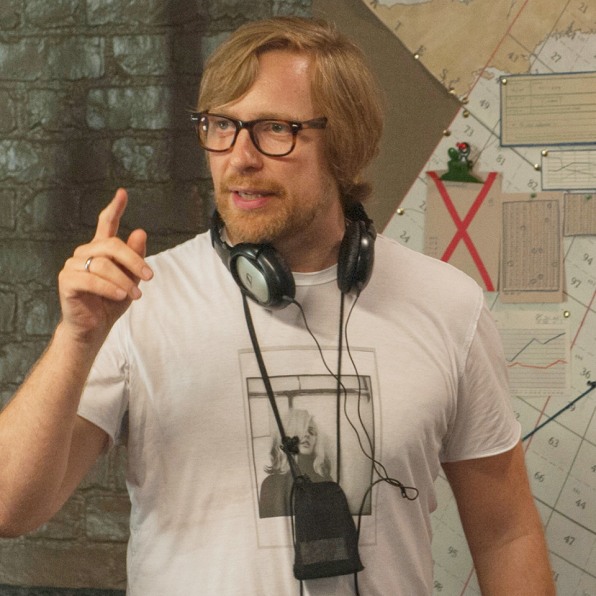
Turing overcame childhood trauma, a prickly disposition and office politics to outsmart Hitler in an accomplishment deemed by Winston Churchill as the unmarried almost important contribution to winning World War II. Norwegian director Morten Tyldum, hired on the forcefulness of his hitting European thriller Headhunters (based on a book past Jo Nesbo) says "Turing was uncompromisingly honest. Every bit soon as he didn't call back you were interesting or smart, he'd only turn around and walk away even if you were in the middle of a sentence."
Tyldum talks to Co.Create about the creative takeaways embodied by Turing's transformation from bad-mannered loner to shrewd team leader.
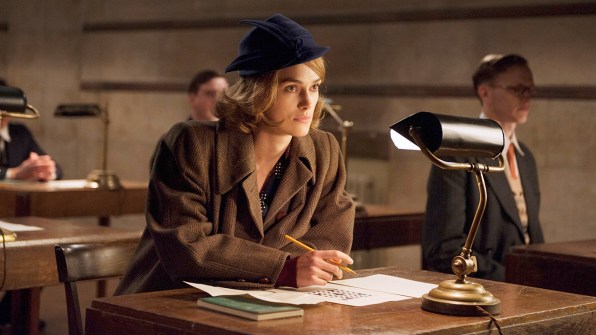
Exercise Good Work to Get Good Work
In 1939 Turing survives a tense job interview and lands work at the government's cloak-and-dagger lawmaking-breaking operation at Bletchley Park in the south of England. Turing gets hired not considering he's likable merely because his resume includes a scholarly paper establishing him equally England'south reigning good on artificial intelligence. Tyldum says, "This is a man who was 23 years erstwhile when he theorized the idea of creating a programmable machine and in that way, Turing foresaw computers and bogus intelligence. These were revolutionary ideas at that fourth dimension."
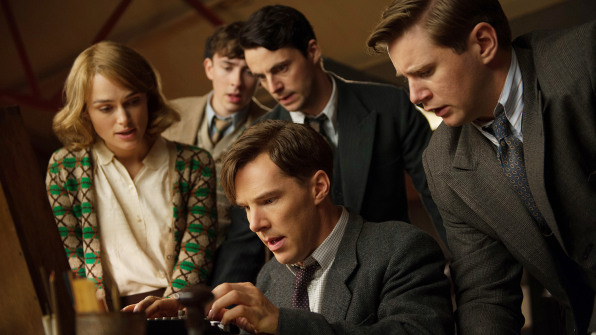
Welcome the Outsider
Midway through The Simulated Game Turing hires a woman for his all-male squad simply because 25-year-sometime Cambridge University graduate Joan Clarke (Keira Knightley) solved a examination crossword puzzle faster than all her rivals. "The prejudice at the time was extraordinary because sexism was institutionalized and built into the constabulary," Tyldum says. "Ane of import thing the motion-picture show shows is that Turing embraced people who were seen as being outsiders, who were different kind of thinkers."
Clarke becomes a primal member of the "Hut viii" performance. "Turing looked by prejudice, which so allows you to exercise new and vivid and great things. Y'all do not motility frontwards past following convention. You celebrate those who are different, who are non burdened by 'normality.'"
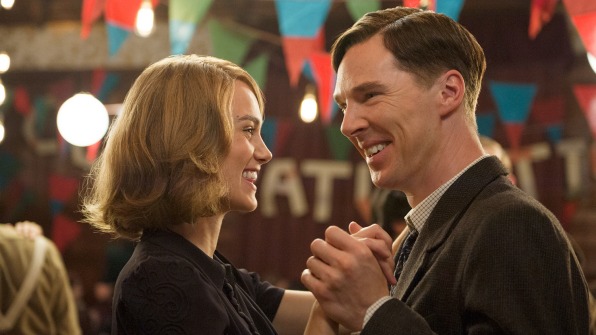
Sometimes It Takes A Bit Of Bravery
Turing needs 100,000 pounds to build the thinking machine that would perform the work of hundreds of men in a matter of hours. When his boss, Naval Commander Denniston (Charles Trip the light fantastic toe) denies the request, Turing writes a letter directly to Prime Minister Winston Churchill and quickly receives the funding along with a job promotion. "Turing was fearless," Tyldum says. "He'due south extremely direct, which tin be seen as socially bad-mannered, and that becomes both his large obstruction simply likewise in many ways his strength."
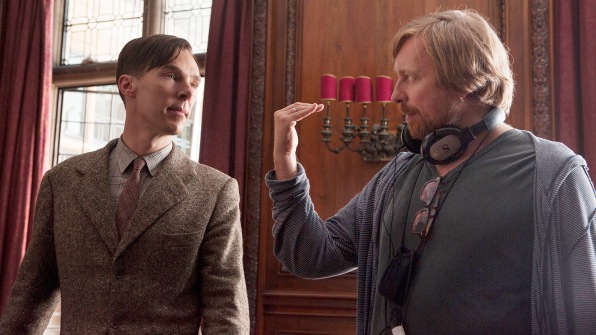
"Do Non Deed Like an Ass"
A loner by temperament, Turing isolates himself to obsess over the bronze, copper, and wire "Bombe" contraption he'south built to trounce Enigma. Helen upbraids him for leaving his collaborators in the nighttime, saying: "I'm a adult female then I tin can't beget to behave like an donkey but neither can you. You need help and the merely way you're going to get it is to brand them like you."
The adjacent day Turing passes out apples to his co-workers and awfully tells a joke. The gesture is appreciated and shortly thereafter, Turing's virtually talented colleague Hugh Alexander (Matthew Goode) makes a critical improvement to Bombe electro-mechanics. "Alan was very much a man who kept to himself and sort of pushed away other people," Tyldum says. "Joan makes him understand that he has to bring other people into his world in social club to solve EnigmaI. The Fake Game shows how important it is to have this uncompromising bulldoze, only you lot also need to work together with other people."
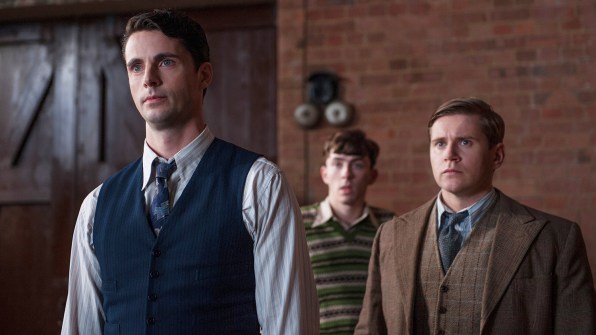
Remember Big, Even When Information technology Hurts
When Turing and his team finally suspension the lawmaking, they face a brutal dilemma: if the Allies immediately human activity on intercepted messages to terminate German attacks, the Nazis volition realize their code has been broken and change tactics accordingly. In the film, Turin decides "Our job isn't to break Enigma. Our job is to win the war." For the side by side four years, he insists that United kingdom of great britain and northern ireland muffle the sources of its intelligence. Tyldum observes, "Sometimes you lot can't afford to do what is human, you lot take to do what is logical. Turing had this very logical mind. He wasn't thinking about emotions in the aforementioned style as most people. MI6 created fake double agents, leaked rumors to Nazis about German officers who partied as well much in Paris and did all kinds of things to camouflage the fact that Turing had actually broken Enigma."
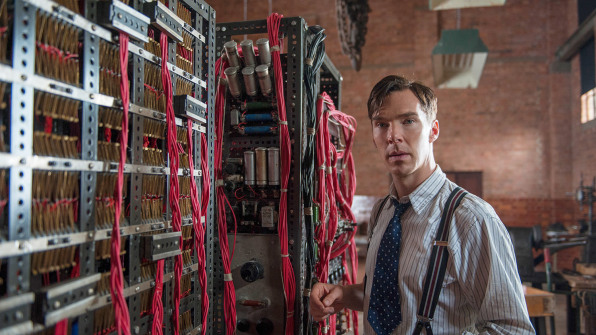
Appoint the Ability of Secrets
Turing's wartime service remained a state clandestine for fifty years only his personal life became public cognition when he got arrested in 1951 for consorting with a gay man. Secrecy defined Turin's legacy, Tyldum says. "In his paper 'The Imitation Game' Alan wrote that you're but homo to the extent that yous can convince other people that you are, that you are what other people call up you are. If a machine tin convince you it'due south a human, and so it's a homo. This is coming from a closeted gay man who is imitating a direct man, who is hiding who he is his whole life. You tin can see how these revolutionary ideas that essentially created computer science came from all closeted gay homo who had to hold everything inside at a fourth dimension when homosexuality was illegal."
Plough Personal Loss into Professional Gain
Flashbacks in The Simulated Game shed light on Turing's difficult childhood. "Alan was an bad-mannered male child who had a stammer and so nosotros wanted to bear witness what information technology was similar for him to be this outsider at schoolhouse," Tyldum says. "When bullies put Alan in a box and cached him in the basis, he's saved past Christopher Morcom (Jack Bannon) who's likewise extremely smart and shares this interest in cryptology." Tragedy ensues. "Alan had very deep feelings for Christopher and it's nigh like his life's work became nigh trying to bring him back. Turing was obsessed with bogus life, artificial intelligence, questions about 'Is there a soul?' 'Is there a heed?' 'Can we re-create consciousness?' You could argue that all of that comes out of Turing's sense of loss and unfulfilled honey."
What Lessons Can Be Learned From The Enigma Machine,
Source: https://www.fastcompany.com/3038521/7-lessons-in-creativity-from-the-brilliant-code-breaker-of-the-imitation-game
Posted by: mirandacoulp1949.blogspot.com


0 Response to "What Lessons Can Be Learned From The Enigma Machine"
Post a Comment